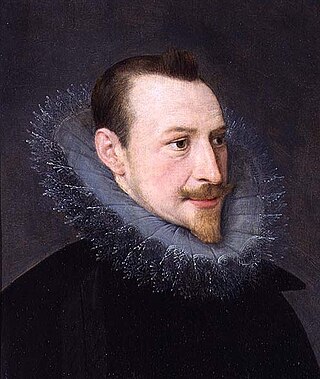
Edmund Spenser was an English poet best known for The Faerie Queene, an epic poem and fantastical allegory celebrating the Tudor dynasty and Elizabeth I. He is recognized as one of the premier craftsmen of nascent Modern English verse, and he is considered one of the great poets in the English language.
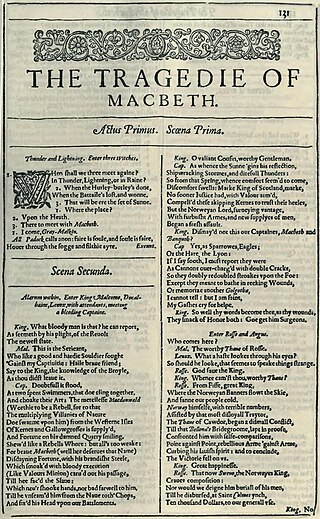
The Tragedy of Macbeth, often shortened to Macbeth, is a tragedy by William Shakespeare, estimated to have been first performed in 1606. It dramatises the physically violent and damaging psychological effects of political ambitions and power. It was first published in the Folio of 1623, possibly from a prompt book, and is Shakespeare's shortest tragedy. Scholars believe Macbeth, of all the plays that Shakespeare wrote during the reign of King James I, contains the most allusions to James, patron of Shakespeare's acting company.

The Faerie Queene is an English epic poem by Edmund Spenser. Books I–III were first published in 1590, then republished in 1596 together with books IV–VI. The Faerie Queene is notable for its form: at over 36,000 lines and over 4,000 stanzas, it is one of the longest poems in the English language; it is also the work in which Spenser invented the verse form known as the Spenserian stanza. On a literal level, the poem follows several knights as a means to examine different virtues. The poem is also an allegorical work. As such, it can be read on several levels, including as praise of Queen Elizabeth I. In Spenser's "Letter of the Authors", he states that the entire epic poem is "cloudily enwrapped in Allegorical devices", and that the aim of publishing The Faerie Queene was to "fashion a gentleman or noble person in virtuous and gentle discipline".

Stephen Jay Greenblatt is an American literary historian and author. He has served as the John Cogan University Professor of the Humanities at Harvard University since 2000. Greenblatt is the general editor of The Norton Shakespeare (2015) and the general editor and a contributor to The Norton Anthology of English Literature.

Sir John Frank Kermode, FBA was a British literary critic best known for his 1967 work The Sense of an Ending: Studies in the Theory of Fiction and for his extensive book-reviewing and editing.
Sir Andrew Jonathan Bate, is a British academic, biographer, critic, broadcaster, scholar, and occasional novelist, playwright and poet. He specializes in Shakespeare, Romanticism and ecocriticism. He is Regents Professor of Literature and Foundation Professor of Environmental Humanities in a joint appointment in the Department of English in The College of Liberal Arts and Sciences and the School of Sustainability in the Global Futures Laboratory at Arizona State University, as well as a Senior Research Fellow at Worcester College, Oxford, where he holds the title of Professor of English Literature. Bate was Provost of Worcester College from 2011 to 2019. From 2017 to 2019 he was Gresham Professor of Rhetoric in the City of London. He was knighted in 2015 for services to literary scholarship and higher education. He is also Chair of the Hawthornden Foundation.

Elizabethan literature refers to bodies of work produced during the reign of Queen Elizabeth I (1558–1603), and is one of the most splendid ages of English literature. In addition to drama and the theatre, it saw a flowering of poetry, with new forms like the sonnet, the Spenserian stanza, and dramatic blank verse, as well as prose, including historical chronicles, pamphlets, and the first English novels. Major writers include William Shakespeare, Edmund Spenser, Christopher Marlowe, Richard Hooker, Ben Jonson, Philip Sidney, Thomas Kyd, and Richard Barnfield.
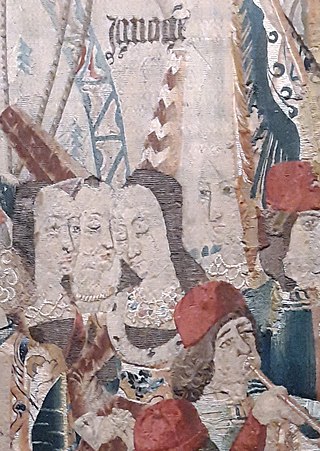
Innogen is a character in the Historia Regum Britanniae and subsequent medieval British pseudo-history. She was said to have been a Greek princess, the daughter of King Pandrasus, and to have become Britain's first Queen consort as the wife of Brutus of Troy, the purported first king of Britain who was said to have lived around the 12th century BC. Her sons Locrinus, Camber, and Albanactus went on to rule Loegria, Cambria, and Alba respectively.
Jonathan G Dollimore is a British philosopher and critic in the fields of Renaissance literature, gender studies, queer theory, history of ideas, death studies, decadence, and cultural theory. He is the author of four academic books, a memoir, and numerous academic articles. With Alan Sinfield he was the co-editor of and key contributor to Political Shakespeare, and the co-originator of the critical practice known as cultural materialism. Dollimore is credited with making major interventions in debates on sexuality and desire, Renaissance literary culture, art and censorship, and cultural theory.
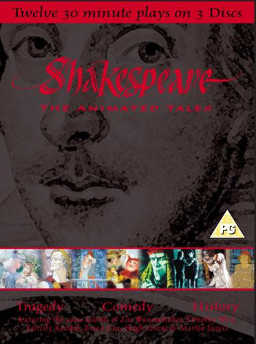
Shakespeare: The Animated Tales is a series of twelve half-hour animated television adaptations of the plays of William Shakespeare, originally broadcast on BBC2 and S4C between 1992 and 1994.

Shakespeare's Sonnet 34 is included in what is referred to as the Fair Youth sequence, and it is the second of a briefer sequence concerned with a betrayal of the poet committed by the young man, who is addressed as a personification of the sun.
David Lee Miller is a scholar of English Renaissance Literature. He is Distinguished Professor of English and Comparative Literature at the University of South Carolina in Columbia. His works include The Poem's Two Bodies: The Poetics of the 1590 Faerie Queen, ; Dreams of the Burning Child: Sacrificial Sons and the Father's Witness ; three edited books; and about two dozen refereed articles that have appeared in scholarly journals such as Modern Language Quarterly, English Literary History, and Publications of the Modern Language Association. He is one of four general editors of The Collected Works of Edmund Spenser, a new scholarly edition under contract to Oxford University Press.
Simon Palfrey is an English Scholar at Oxford University and a Fellow in English at Brasenose College, Oxford University. He specialises in Shakespeare and Renaissance literature.
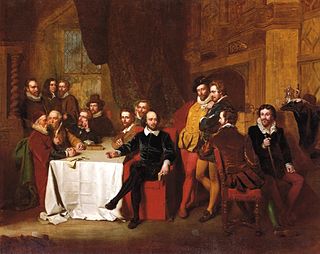
William Shakespeare's style of writing was borrowed from the conventions of the day and adapted to his needs.
Orgoglio is a literary character in Edmund Spenser's famous epic The Faerie Queene. He appears in the seventh canto of Book One as a beast and attacks the main character, Redcrosse, who symbolizes the ultimate Christian knight, during a moment of weakness. "Orgoglio" means "pride" in Italian. In chapter IX of Waverley, by Sir Walter Scott, the manor of Bradwardyne is compared to the castle of Orgoglio.

Michael Witmore is a scholar of Shakespeare and rhetoric, a digital humanist, and former director of a library and cultural institution. He served as the director of the Folger Shakespeare Library in Washington, D.C., from 2011 to June 2024, during which the Folger Shakespeare Library conceived and completed an $81.5 million, four-year renovation project. He currently consults on digital preservation and cultural accessibility.
The House of Pride is a notable setting in Edmund Spenser's epic poem The Faerie Queene. The actions of cantos IV and V in Book I take place there, and readers have associated the structure with several allegories pertinent to the poem.
Tiffany Stern is a historian and Shakespeare scholar. She is Professor of Shakespeare and Early Modern Drama at The Shakespeare Institute, University of Birmingham.

Tom de Freston is a visual artist and writer based in Oxford. His work is known for his focus on images of humanity, despair, that ‘convey our most haunted fears about a world struggling for survival’. His practice is dedicated to the construction of multimedia worlds, combining paintings, film, writing and performance into immersive visceral narratives.












